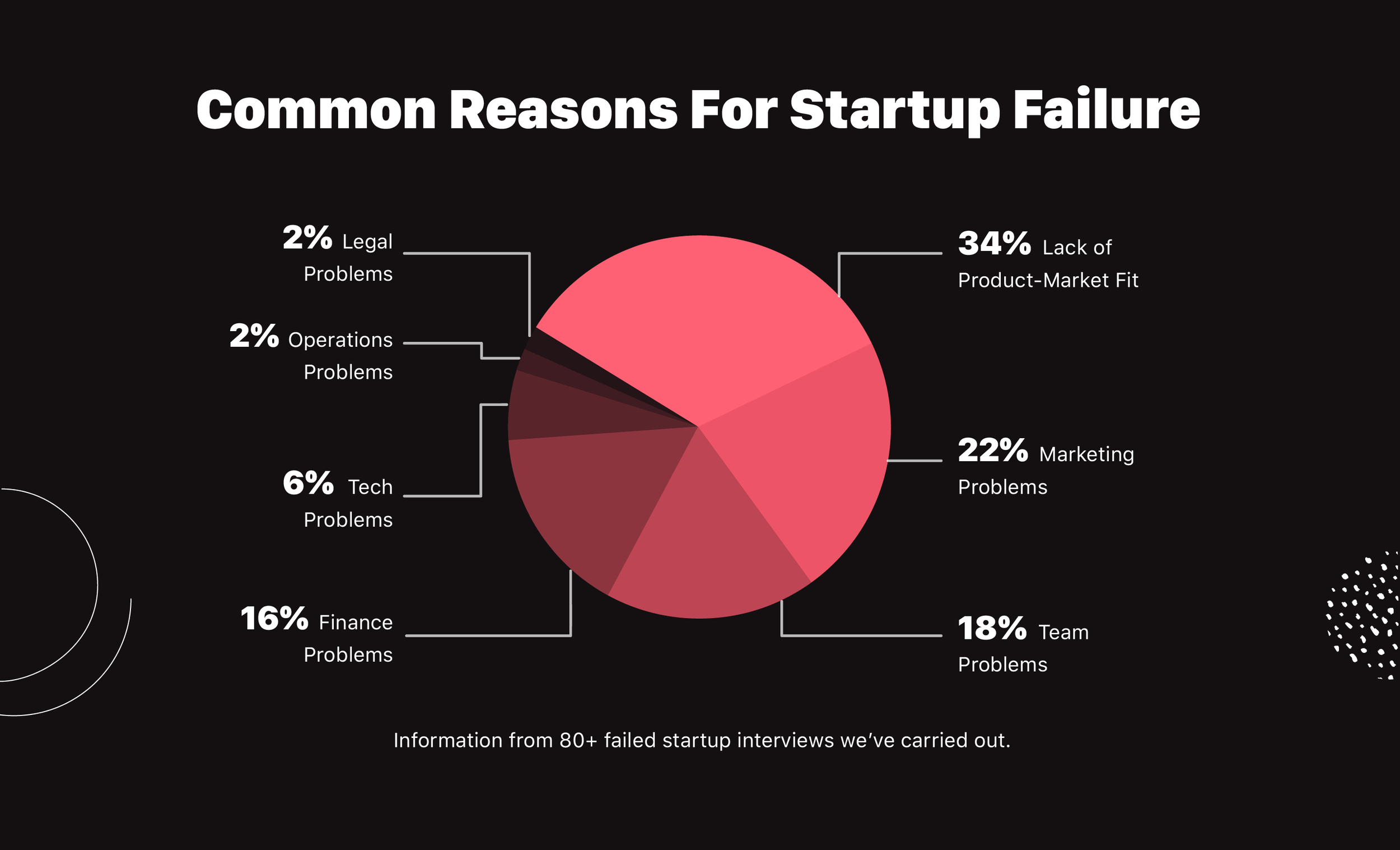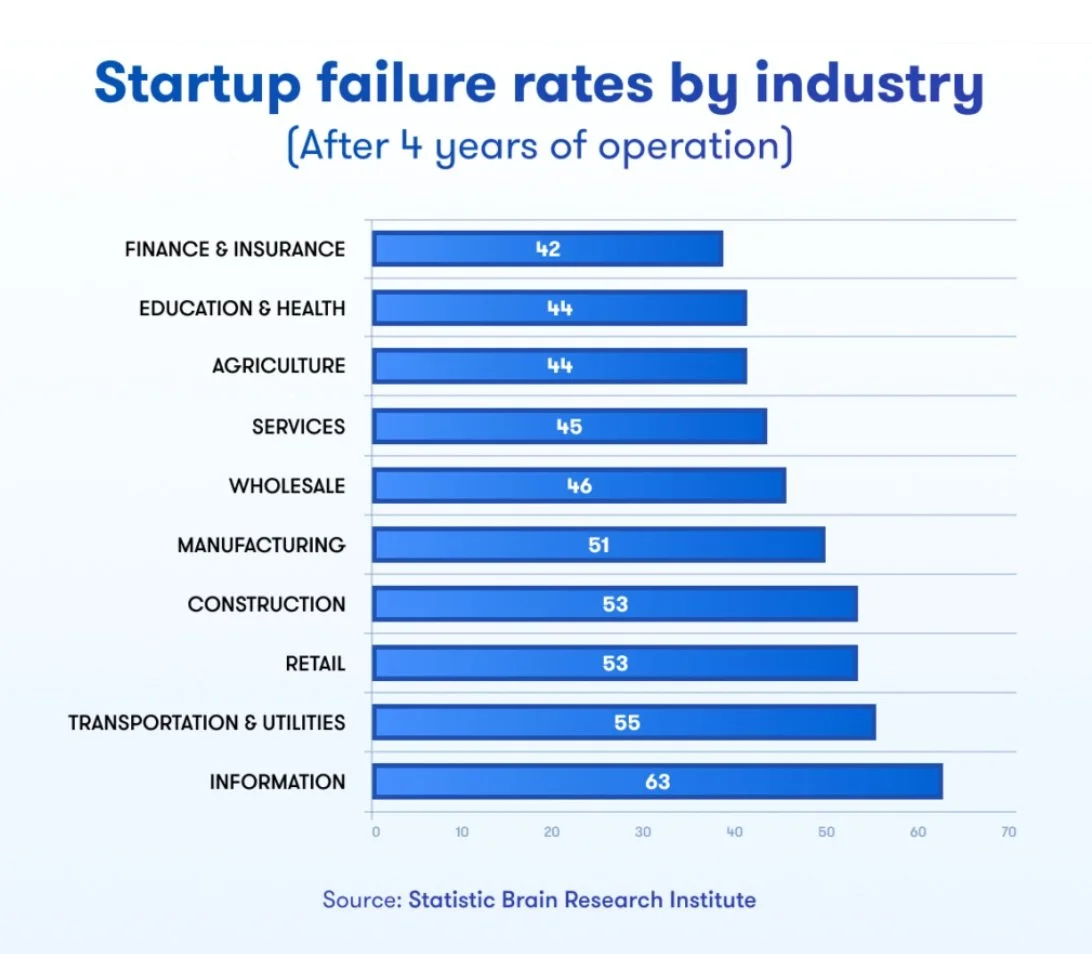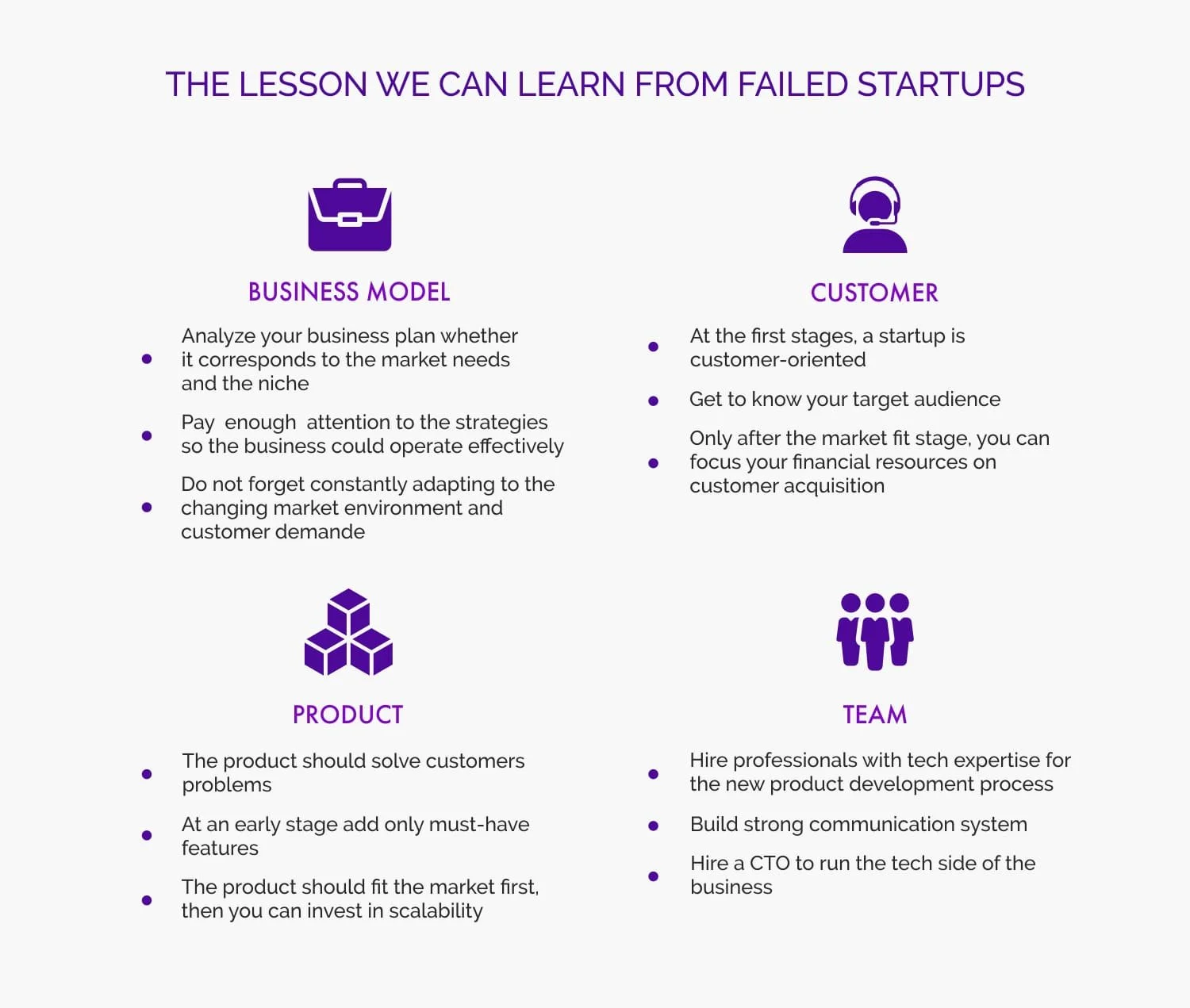Why Startups Fail in the First 10 Years: 8 Key Reasons & Lessons Learned
Starting a business is an exciting journey filled with possibilities, but the harsh reality is that many startups do not survive beyond their initial five to ten years. According to research, approximately 90% of startups fail, 50% of them shutting down within the first five years. Understanding the reasons behind these failures can help aspiring entrepreneurs avoid common pitfalls and increase their chances of long-term success. Below are the key reasons why startups fail within their early years and what can be learned from these challenges.
Source: demandsage
1. Lack of Market Need
One of the most common reasons startups fail is that they create a product or service that does not address a significant market demand. Many entrepreneurs fall in love with their ideas without validating whether there is a real need for their solution. Without sufficient market demand, acquiring customers becomes an uphill battle, leading to stagnation and eventual failure.
Key Factors Contributing to This Issue:
Failure to conduct adequate market research
Misidentifying target customers
Ignoring competitors and alternative solutions
Overestimating the uniqueness of the product or service
Lesson Learned: Conduct thorough market research before launching a business. Engage with potential customers, test the viability of your product, and ensure that there is a genuine demand before committing resources. Use surveys, focus groups, and beta testing to gauge interest and refine the product accordingly.
2. Insufficient Capital & Poor Financial Management
Running out of money is a major reason why startups fail. Many entrepreneurs underestimate the amount of funding required to sustain their business through the early stages. Poor budgeting, unexpected expenses, and lack of financial planning can quickly lead to cash flow problems, making it difficult to continue operations.
Common Financial Pitfalls:
Underestimating startup costs
Overestimating early revenue projections
Inefficient cost management
Lack of a contingency fund
Poor investor relations and difficulty securing funding
Lesson Learned: Develop a detailed financial plan, secure adequate funding, and keep a close eye on cash flow. Consider different funding options such as venture capital, angel investors, bank loans, or bootstrapping. Keep operational expenses low and prioritize spending on business-critical areas.
Source: Inventiva
3. Weak Business Model
A flawed business model can doom a startup from the start. Some businesses fail because they cannot generate enough revenue to cover their costs, or their pricing strategies do not align with market expectations. Without a sustainable revenue model, even the best ideas can fail to take off.
Signs of a Weak Business Model:
Lack of clear revenue streams
Dependence on a single customer segment
Misalignment between cost structure and pricing strategy
High customer acquisition costs with low lifetime value
Lesson Learned: Ensure that your business model is well-defined and scalable. Test different revenue streams and pricing structures to determine what works best for your market. Continuously refine the model based on feedback and performance data.
4. Poor Team & Leadership Issues
A startup’s success heavily depends on the strength of its team. Many businesses fail due to conflicts among founders, lack of industry expertise, or hiring the wrong people. A weak leadership team that lacks vision, adaptability, or decision-making skills can lead to poor execution and business failure.
Common Leadership & Team Challenges:
Poor delegation and micromanagement
Lack of clearly defined roles and responsibilities
Conflicts among founders and key team members
Hiring employees who lack necessary skills or cultural fit
Inability to attract and retain top talent
Lesson Learned: Build a strong team with complementary skills and a shared vision. Ensure that team members are aligned in terms of goals, values, and commitment to the business. Additionally, focus on leadership development, effective communication, and team cohesion.
“The one who falls and gets up is stronger than the one who never tried. Do not fear failure but rather fear not trying.”
5. Failure to Adapt & Innovate
The business landscape is constantly evolving, and startups that fail to adapt to changing market conditions often struggle to survive. Many companies become too rigid in their original plans and resist pivoting when necessary.
Reasons Why Startups Struggle to Adapt:
Overcommitment to an initial idea without flexibility
Failure to monitor industry trends and customer behavior
Ignoring technological advancements that impact the market
Resistance to pivoting due to sunk cost fallacy
Lesson Learned: Stay flexible and open to change. Regularly assess market trends, listen to customer feedback, and be willing to pivot when needed to stay relevant and competitive. Startups should embrace an agile mindset and continuously iterate their offerings.
6. Ineffective Marketing & Customer Acquisition
Even the best products need a solid marketing strategy to reach the right audience. Some startups fail because they do not invest in effective marketing strategies or misunderstand their target audience. Without a steady flow of customers, revenue dries up quickly.
Marketing Mistakes Startups Make:
Inconsistent brand messaging
Targeting the wrong audience
Neglecting digital marketing and social media
Poor customer engagement and retention strategies
Relying solely on paid ads without organic growth efforts
Lesson Learned: Develop a strong marketing plan that includes digital marketing, content marketing, SEO, social media engagement, and customer retention strategies. Identify and understand your target audience and craft messages that resonate with them. Leverage data analytics to measure and optimize marketing efforts.
Source: Consult Port
7. Legal & Regulatory Challenges
Many startups fail due to legal complications, regulatory fines, or compliance issues. Neglecting necessary permits, tax obligations, or intellectual property rights can lead to lawsuits and financial penalties that cripple a business.
Key Legal Risks:
Inadequate contracts and agreements
Non-compliance with labor laws and tax regulations
Intellectual property disputes
Failure to secure necessary licenses and permits
Lesson Learned: Consult legal experts early on to ensure compliance with all regulations and legal requirements. Protect your intellectual property and stay informed about industry-specific laws that may affect your business.
8. Overexpansion Too Soon
Scaling too quickly can be just as dangerous as not growing at all. Some startups expand their operations before they are financially or operationally ready, leading to increased expenses and inefficiencies that drain resources.
Warning Signs of Premature Scaling:
Rapid hiring without a solid operational structure
Expanding to new markets without proper research
Overinvestment in marketing without proven ROI
Weak operational infrastructure that cannot handle growth
Lesson Learned: Grow at a sustainable pace. Focus on building a strong foundation before expanding. Ensure that your business processes, finances, and team can support growth before scaling operations.
Source: Otosection
Successfully navigating the startup journey requires a strategic approach and a deep understanding of the challenges that new businesses face. One of the most crucial steps is validating market demand. Before investing significant time and resources, entrepreneurs should conduct thorough market research, engage with potential customers, and test their product or service in real-world scenarios. This process helps ensure that the startup is addressing a genuine problem that people are willing to pay for, reducing the risk of launching a solution that lacks demand.
Securing adequate funding is another key factor in survival. Many startups fail because they underestimate the amount of capital required to sustain operations before becoming profitable. Entrepreneurs must explore various funding options, such as bootstrapping, angel investors, venture capital, or small business loans, while also maintaining strong financial discipline to optimize cash flow and manage expenses wisely.
Building a strong team is equally important. A startup’s success is heavily influenced by the expertise, commitment, and chemistry of its founders and key team members. Having a well-balanced team with diverse skills—such as leadership, technical expertise, marketing, and financial management—enhances problem-solving capabilities and drives business growth. Additionally, fostering a strong company culture, clear communication, and shared vision ensures that the team remains aligned and motivated during challenging times.
Staying adaptable is a critical trait for startups. The business landscape is constantly changing, and companies that fail to pivot or evolve often struggle to stay relevant. Entrepreneurs should embrace an agile mindset, continuously monitor industry trends, and be open to adjusting their business model based on market shifts and customer preferences. This flexibility can make the difference between long-term success and early failure.
Lastly, prioritizing customer feedback is a powerful way to refine products, enhance services, and build customer loyalty. Startups that actively listen to their audience, address pain points, and implement valuable improvements are more likely to gain traction and establish a loyal customer base. Engaging with users through surveys, reviews, and direct communication helps create a customer-centric approach that fosters growth and retention.
Ultimately, learning from the mistakes of failed businesses is one of the best ways to increase a startup’s chances of thriving beyond the critical first five years. By studying real-world failures, analyzing what went wrong, and applying those insights to their own venture, entrepreneurs can proactively mitigate risks and build a more resilient business. Success in the startup world is not just about having a great idea—it’s about execution, adaptability, and a relentless focus on delivering value to the market.





